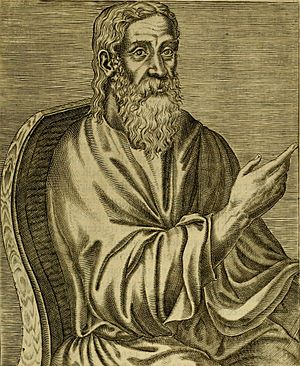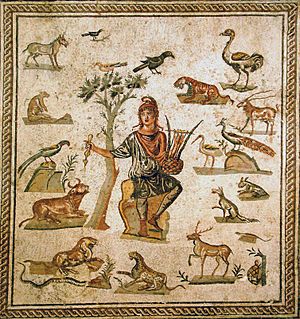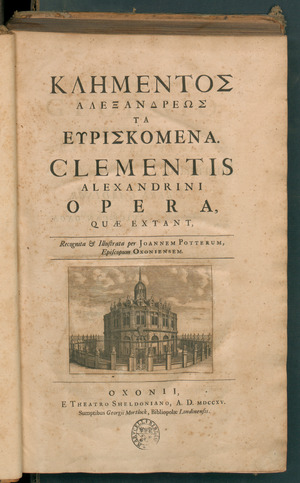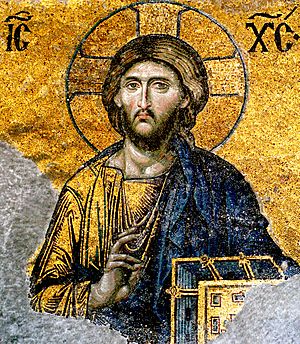Clement of Alexandria facts for kids
Quick facts for kids SaintClement of Alexandria |
|
|---|---|

Clement depicted in 1584
|
|
| Church Father, Theologian | |
| Born | Titus Flavius Clemens c. 150 AD Athens, Achaia, Roman Empire |
| Died | c. 215 AD Jerusalem, Syria Palaestina, Roman Empire |
| Venerated in | Oriental Orthodoxy Eastern Catholicism Anglican Communion |
| Canonized | Pre-congregation |
| Feast | 4 December (Eastern Catholicism, Anglicanism) 5 December (Episcopal Church, Anglicanism) |
| Controversy | Regarded as a heretic by Photius. |
|
Catholic cult suppressed
|
1586 by Pope Sixtus V |
Titus Flavius Clemens, known as Clement of Alexandria (Ancient Greek: Κλήμης ὁ Ἀλεξανδρεύς; c. 150 – c. 215 AD), was an important Christian thinker and philosopher. He taught at the famous Catechetical School of Alexandria. Two of his most well-known students were Origen and Alexander of Jerusalem.
Clement became a Christian later in life. He was very educated and knew a lot about Greek philosophy and literature. His writings show he was greatly influenced by Hellenistic philosophy, especially the ideas of Plato and the Stoics.
Today, Clement is seen as a Church Father, which means he was an important early Christian writer and teacher. He is honored as a saint in some Christian traditions, like Coptic Christianity, Eastern Catholicism, Ethiopian Christianity, and Anglicanism. However, he was removed from the list of saints in Western Catholicism in 1586.
Contents
Clement of Alexandria's Life
Clement's exact birthdate and birthplace are not known for sure. It is thought he was born around 150 AD, possibly in Athens or Alexandria.
His parents were not Christians; they followed pagan religions. Clement became a Christian later in his youth. He traveled a lot, visiting Greece, Asia Minor, Palestine, and Egypt. These journeys were mainly for religious reasons, as he sought out different teachers.
Around 180 AD, Clement arrived in Alexandria. There, he met Pantaenus, who taught at the Catechetical School. Clement studied under Pantaenus and later became a priest. We don't know much else about his personal life in Alexandria. He might have even been married, based on some of his writings.
During a time when Christians were persecuted (around 202–203 AD), Clement left Alexandria. He likely died around 215 AD, but his exact death location is unknown.
Clement's Main Writings
Three of Clement's most important works have survived completely. They are often called a "trilogy" because they work together:
- The Protrepticus (Exhortation) – written around 195 AD
- The Paedagogus (Tutor) – written around 198 AD
- The Stromata (Miscellanies) – written between 198 AD and 203 AD
Protrepticus (The Exhortation)

The Protrepticus is like an invitation to the Greek people to become Christians. In this book, Clement shows how much he knew about Greek myths and religions. He explains how Greek religion developed over time, from worshipping the sun and moon to honoring human feelings and then creating many gods.
Clement criticized Greek paganism because its gods were not good role models. He also argued that their idols were just carved wood and stone, not real gods. He believed that the Christian message was the true path. Clement compared the pagan songs of Orpheus to the divine message of Christ, called the Logos. He said that only by becoming Christian could people truly understand this universal truth.
Paedagogus (The Tutor)
The title Paedagogus means "tutor" or "teacher." In this book, Clement explains that Christ is the teacher for all humans. He uses the idea of Christians being like children who are being taught by Christ. Clement wanted to show how Christians should truly respond to God's love.
He believed that by trying to be like Christ, who was perfect and without sin, people could find salvation. Clement also taught that God's guidance helps people avoid sin because God loves everyone.
Clement believed that men and women are equal in God's eyes because salvation is for everyone. He even suggested that Christ is neither fully male nor female, and that God has both male and female qualities. Clement supported women having active roles in the church.
In this book, Clement also gives practical advice for living a Christian life. He encouraged a simple lifestyle, avoiding too much food or fancy clothes. He believed Christians should enjoy God's creation but not let worldly pleasures distract them from their faith.
Stromata (The Miscellanies)
The Stromata is a collection of various topics, as its title "Miscellanies" suggests. Clement meant for it to be a deeper study of theology after the practical advice in Paedagogus.
The first part talks about Greek philosophy. Clement believed that philosophy helped prepare Greeks to accept Christianity, just as the Law prepared the Jews. He also argued that many important Greek ideas came from other cultures, especially Jewish culture.
The second part focuses on faith and philosophical reasoning. Clement said that both are important, but faith in God comes first. He believed that the scripture is a true philosophy that is completed by human reason through Christ (the Logos). Faith is a choice and a key step to getting closer to God.
The third book discusses asceticism, which is living a simple life and avoiding worldly pleasures. Clement argued against the idea that Christians should leave their families for an ascetic life. He believed that asceticism is only meaningful if it comes from a Christian motivation.
The fourth book talks about martyrdom, which is dying for one's faith. Clement said that while Christians should not be afraid of death, they should not actively seek to become martyrs. He believed that true martyrdom comes from living a good Christian life, not just from the way one dies.
The fifth book returns to the topic of faith. Clement explained that truth and goodness can only be understood by the mind, and faith helps us see what is unseen. He stressed that knowing God comes through faith and by fixing our moral faults.
In the sixth book, Clement tried to show that Greek poets got some of their ideas from the Bible. He also discussed sin and hell. He believed that God's promise of salvation is for everyone, even those who might be in hell.
The last book describes what Christ is like and what a true Christian should be. Clement criticized simple ideas of God that made Him seem too human. He also discussed prayer and the connection between love and knowledge. He believed that bad actions come from not knowing the truth, not from bad intentions.
Other Writings
Clement also wrote Salvation for the Rich, which is about how wealthy people can be saved. He argued that Jesus' words about giving up wealth should not be taken literally. Instead, he believed that having money is not wrong as long as it is used for good, like helping others. The important thing is not to let money control your spirit.
Some of Clement's other works only exist in small pieces. These include writings about a "celestial hierarchy," which is a complex idea of how the universe is structured with different levels of beings, from God down to humans. He believed that humans could become like angels over time.
Clement's Influence
Eusebius, an early church historian, was the first to write about Clement's life and works. He listed Clement's writings and included quotes from them.
Later, in the 9th century, Photios I of Constantinople criticized some of Clement's ideas, calling them heretical. For example, Photios disagreed with Clement's ideas that matter and thought might be eternal, or that Christ was in some way created. However, Photios still admired Clement's learning and writing style.
Today, Clement of Alexandria is a very important figure for scholars studying early Christianity. They study his ideas about the Bible, his understanding of Christ, and how his thoughts connected with non-Christian philosophy. He greatly influenced his student Origen and many other Christian thinkers.
Veneration
| Saint Clement of Alexandria |
|
|---|---|
| Church Father, Theologian | |
| Venerated in | Oriental Orthodoxy Eastern Catholicism Anglican Communion |
| Canonized | Pre-congregation |
| Feast | 4 December (Eastern Catholicism, Anglicanism) 5 December (Episcopal Church, Anglicanism) |
| Controversy | Regarded as a heretic by Photius. |
|
Catholic cult suppressed
|
1586 by Pope Sixtus V |
Until the 17th century, Clement was honored as a saint in the Roman Catholic Church. His feast day was December 4th. However, his name was later removed from the official calendar by Pope Sixtus V in 1586. This was because not much was known about his life, and some of his teachings were seen as questionable.
Even though he is not widely honored in Eastern Christianity, some Orthodox leaders and texts still refer to him as a saint. The Coptic tradition also considers Clement a saint, and there is a Coptic Orthodox Christian Academy named after him in Nashville, Tennessee.
Clement is also remembered and honored in Anglicanism.
Clement's Theology
Gnosis (Spiritual Knowledge)
Clement taught that faith is the basis for salvation. But he also believed that faith leads to "gnosis," which for him meant deep spiritual and mystical knowledge. He used the word "gnosis" differently from the Gnostics, whom he disagreed with. Clement saw two types of Christians: those who follow God's law, and "Christian gnostics" who live with deeper discipline and love. His ideas about gnosis might have influenced the start of monasticism in Egypt.
Philosophy and Faith
Clement believed that philosophy helped prepare the Greek world to accept Christianity. He often tried to combine ideas from Greek philosophy with teachings from the Bible. He defined philosophy as "the desire for true being and the studies which lead to it." Many see Clement as the person who started the important tradition of Christian philosophical theology.
Universal Salvation
Many scholars believe Clement was one of the first Christians to teach about Christian universalism. This is the idea that eventually, every person will be saved. Clement thought that God's punishments were meant to correct and help people, not just to punish or destroy them. He wrote that God "destroys no one but gives salvation to all." He believed God wants everyone to turn to Him and be saved.
Education and Discipline
For Clement, disciplining one's body helps discipline the soul. That's why he gave detailed instructions on how Christians should behave in his book The Instructor. He believed that once a Christian's feelings are controlled by reason (the Word of God), they can then move on to deeper philosophical study and contemplation.
Clement thought that true philosophy and human knowledge come from the Logos (Christ), who is the source of all truth. He believed that Greek education could prepare a Christian's mind to understand and defend the truth. He also felt that subjects like geometry, music, and grammar could help Christians focus their efforts on what is truly useful.
Economics
Clement did not believe that Jesus' command to "sell what you have and give to the poor" meant everyone had to give up all their possessions. He argued that the Bible does not require every person to give up all property. He thought that wealth could be used for good or bad. He warned about the dangers of wealth but understood that it could be used charitably.
Creation
Clement believed that the "days" mentioned in the Bible's book of Genesis were not literal 24-hour days but were symbolic. He thought there was a "double creation": first an invisible world, and then the material world. He was influenced by Plato in believing that formless matter existed before the world was created.
Works
Editions
- Sylburg, Friedrich (ed.) (1592). Clementis Alexandrini Opera Quae Extant. Heidelberg: ex typographeio Hieronymi Commelini.
- Heinsius, Daniel (ed.) (1616). Clementis Alexandrini Opera Graece et Latine Quae Extant. Leiden: excudit Ioannes Patius academiae typographus.
- Potter, John (ed.) (1715). Clementis Alexandrini Opera, 2 vols. Oxonii: e theatro Sheldoniano. Vol. 1. Cohortatio ad gentes. Paedagogus. Stromatum I-IV. Vol. 2. Stromatum V-VIII. Quis dives salvetur. Excerpta Theodoti. Prophetarum ecologiae. Fragmenta.
- Klotz, Reinhold (ed.) (1831–34). Titi Flaui Clementis Alexandrini Opera Omnia, 4 vols. Leipzig: E. B. Schwickert. Vol. 1. Ρrotrepticus. Paedagogus. Vol. 2. Stromatorum I-IV. Vol. 3. Stromatourm V-VIII. Quis dives salvetur. Vol. 4. Fragmenta. Scholia. Annotationes. Indices.
- Migne, J.-P. (ed.) (1857). Clementis Alexandrini Opera Quae Exstant Omnia, 2 toms. (= PG 8, 9) Paris: J.-P. Migne. Tom. 1. Cohortatio ad gentes. Paedagogus. Stromata I-IV. Tom. 2. Stromata V-VIII. Quis dives salvetur. Fragmenta.
- Dindorf, Wilhelm (ed.) (1869). Clementis Alexandrini Opera, 4 vols. Oxonni: e typographeo Clarendoniano. Vol. 1. Ρrotrepticus. Paedagogus. Vol. 2. Stromatum I-IV. Vol. 3. Stromatum V-VIII. Vol. 4. Annotationes. Interpretum.
- Barnard, P. Mourdant (ed.) (1897). Clement of Alexandria, Quis dives salvetur. Texts and Studies 5/2. Cambridge: Cambridge University Press.
- de:Otto Stählin (ed.) (1905–36). Clemens Alexandrinus, 4 bds. (= GCS 12, 15, 17, 39) Leipzig: J. C. Hinrichs. Bd. 1. Ρrotrepticus und Paedagogus. Bd. 2. Stromata I-VI. Bd. 3. Stromata VII-VIII. Excerpta ex Theodoto. Eclogae prophetica. Quis dives salvetur. Fragmente. Bd. 4. Register.
- Marcovich, Miroslav and Jacobus C. M. van Winden (eds.) (2002). Clementis Alexandrini Paedagogus. Leiden: Brill. ISBN: 978-9004124707
Translations
- Wilson, William (trans.) (1867). "The Writings of Clement of Alexandria". In Ante-Nicene Fathers, ed. A. Roberts, et al., 2:163–629. (Reprint 1905) New York: Charles Scribner's Sons.
- Barnard, P. Mourdant (trans.) (1901). A Homily of Clement of Alexandria, Entitled: Who is the Rich Man that is being Saved? London: SPCK.
- Hort, F. J. A. and Joseph B. Mayor (eds. & trans.) (1902). Clement of Alexandria, Miscellanies Book VII. London: Macmillan. ISBN: 978-1108007542
- Patrick, John (1914). Clement of Alexandria, 183-85. Edinburgh: Wm. Blackwood. (Exhortation to Endurance, or, To the Newly Baptized; cf. Butterworth 1919, 371 ff.)
- Butterworth, G. W. (ed. & trans.) (1919). Clement of Alexandria, Exhortation to the Greeks, Rich Man's Salvation, etc. (= LCL 92) Cambridge: Harvard University Press. ISBN: 978-0674991033
- Casey, Robert Pierce (ed. & trans.) (1936). The Excerpta ex Theodoto of Clement of Alexandria. Studies and Documents 1. London: Christophers.
- Oulton, J. E. L. and Henry Chadwick (trans.) (1954). Alexandrian Christianity, 40–165. Philadelphia: Westminster Press. (Miscellanies, Books III, VII) ISBN: 978-0664241537
- Wood, Simon P. (trans.) (1954). Clement of Alexandria, Christ the Educator. Fathers of the Church 23. Washington, D.C.: Catholic University of America Press. ISBN: 978-0813215624
- Ferguson, John (trans.) (1991). Clement of Alexandria, Stromateis, Books 1–3. Fathers of the Church 85. Washington, D.C.: Catholic University of America Press. ISBN: 978-0813214337
See also
 In Spanish: Clemente de Alejandría para niños
In Spanish: Clemente de Alejandría para niños
- Buddhism and the Roman world
- Alexandrian school
 | Jewel Prestage |
 | Ella Baker |
 | Fannie Lou Hamer |




